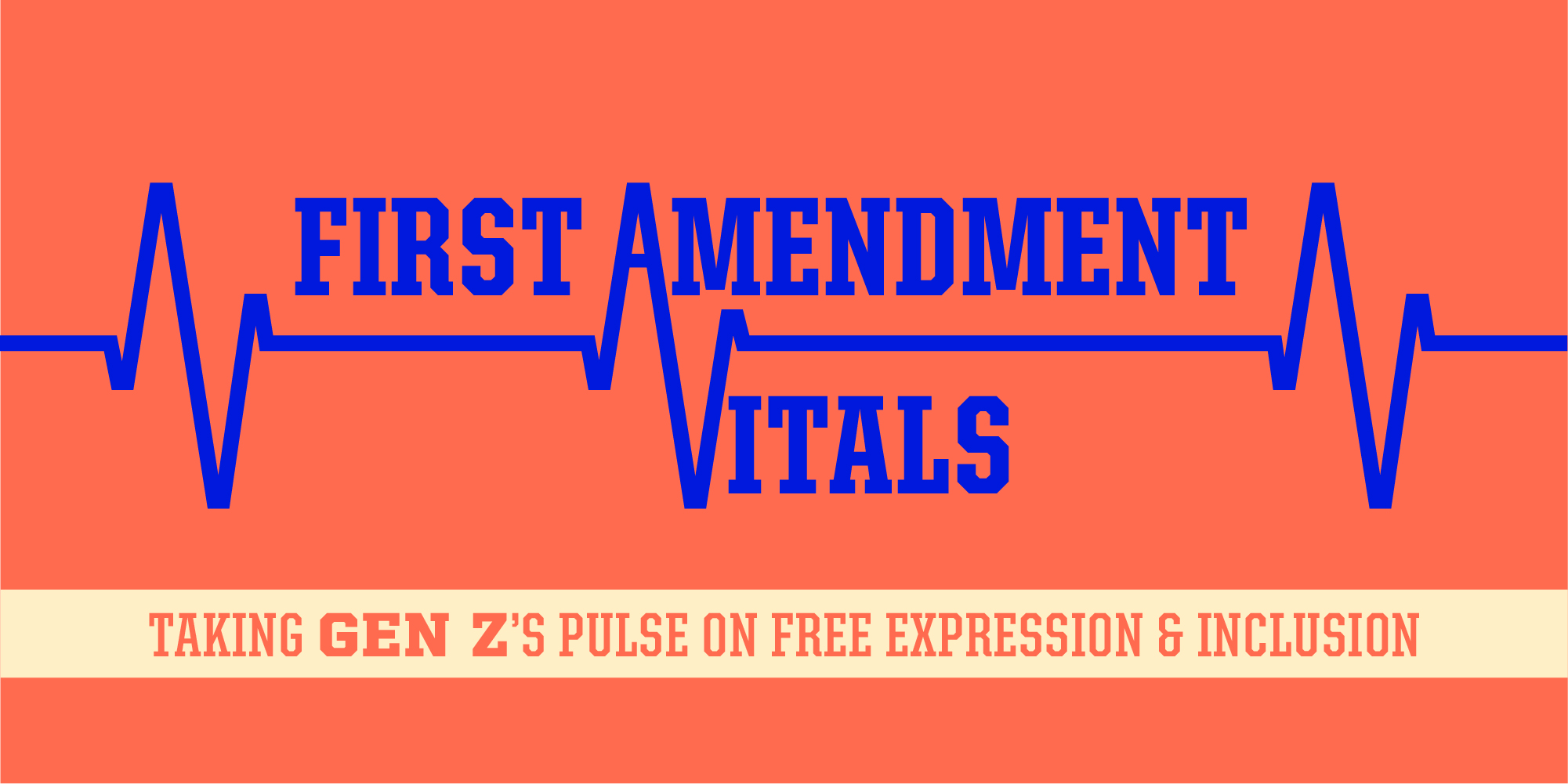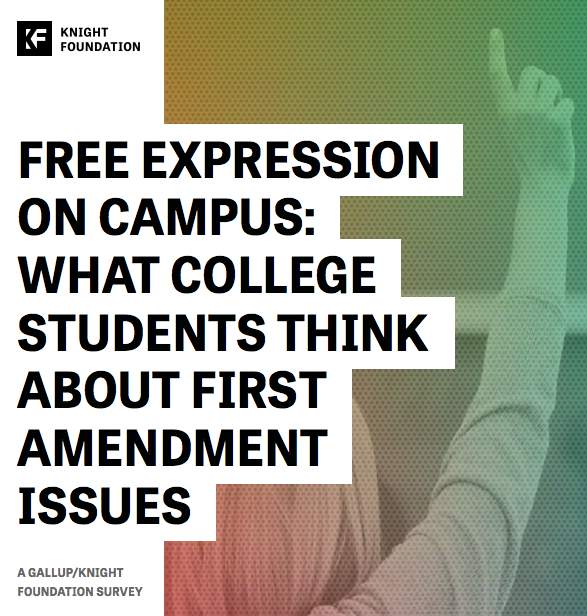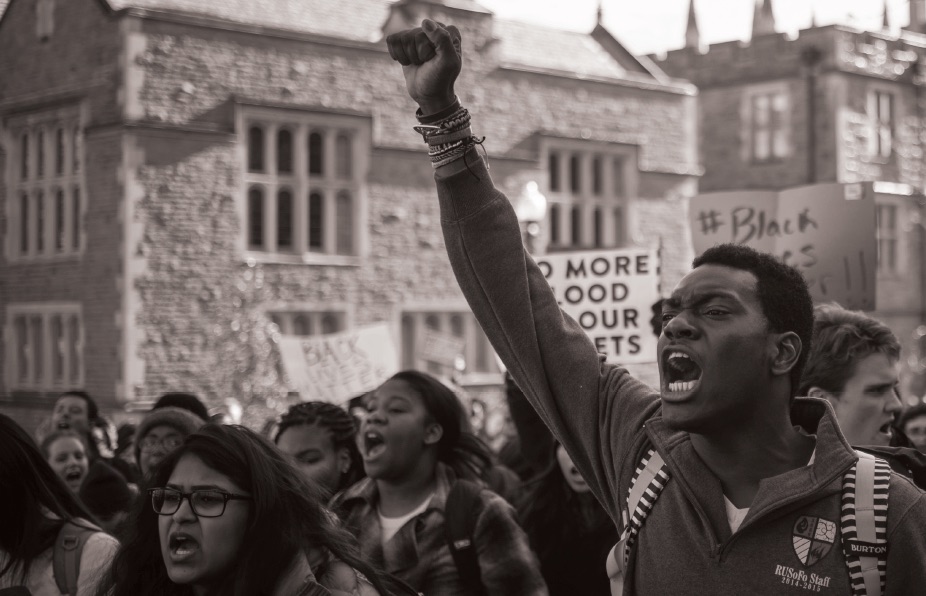MIAMI—May 13, 2019—As college students across the United States continue to test the limits and protections of the First Amendment, a new report by College Pulse reveals that students show support for these rights, but are divided on whether it’s more important to promote an inclusive society that welcomes diverse groups or to protect the extremes of free speech. Opinions sharply diverge by gender, race, sexual orientation, political affiliation and religion.
Supported by the John S. and James L. Knight Foundation, the report used a mobile app and web portal to survey 4,407 full-time college students enrolled in four-year degree programs in December 2018. It builds on previous surveys of college students and their views on the First Amendment supported by Knight in 2016 and 2018.
The report showed that more than half (53 percent) of students favor protecting free speech rights, while nearly as many (46 percent) say it’s important to promote an inclusive and welcoming society. At the same time, 58 percent of students said that hate speech should continue to be protected under the First Amendment while 41 percent disagree. The report’s exploration of perceptions by race, gender, sexual orientation and religion further highlight stark differences in student views on these issues.
“There is a new class of students on college campuses, increasingly varied in background and ideology, who are grappling with the reach and limits of free speech and what it means in the 21st century. Studying their views is key to understanding the impact that they may have on rights that are fundamental to our democracy,” said Sam Gill, Knight Foundation vice president for learning and communities.
Other key findings include:
Opinions on whether it’s more important to promote an inclusive society that welcomes diverse groups or to protect free speech are sharply divided by gender, race and religion.
- Nearly six in 10 college women say that promoting an inclusive society is the more important value, versus 28 percent of college men. Seventy-one percent of college men favor protecting free speech over inclusivity, while only 41 percent of college women express this view.
- Black college students are more likely than students of other racial and ethnic backgrounds to say that inclusivity is a more important value than free speech. More than six in 10 black college students agree that promoting an inclusive society that welcomes diverse groups is more important than protecting free speech. Forty-nine percent of Hispanic students and 42 percent of white students hold the same view.
- A majority of white (58 percent) students and half (50 percent) of Hispanic students say that protecting free speech rights should be the higher priority.
- A majority of Mormon (81 percent), white evangelical Protestant (71 percent), white mainline Protestant (64 percent), and Catholic students (62 percent) say that protecting free speech is more important than promoting inclusivity. In contrast, a majority of Jewish students (65 percent), students who are members of East Asian religions such as Hinduism or Buddhism (60 percent), and religiously unaffiliated students (54 percent) say that promoting a welcoming, inclusive society is more important.
Most college students agree that hate speech, defined as “attacks [on] people based on their race, religion, gender identity or sexual orientation,” ought to be protected by the First Amendment. Opinions diverge by gender, race and sexual orientation.
- Nearly six in 10 college students believe hate speech should be protected, while 41 percent disagree.
- A majority (53 percent) of college women say that hate speech should not be protected by the First Amendment, while 46 percent say it should. In contrast, 74 percent of college men say hate speech should be protected by the First Amendment.
- A majority of white (62 percent) students agree that hate speech should be protected by the First Amendment. In contrast, less than half (48 percent) of black college students believe that hate speech should be protected, while 51 percent say it should not. Similarly, about half (52 percent) of Hispanic students say hate speech should be protected, while 47 percent disagree.
- Sixty-four percent of heterosexual students say that hate speech should be protected, while only 35 percent of gay and lesbian college students agree.
College students largely agree that the political and social climate on college campuses prevents some students from saying what they really believe because they’re afraid of offending their classmates.
- Sixty-eight percent of college students say their campus climate precludes students from expressing their true opinions because their classmates might find them offensive; 31 percent disagree.
Students largely don’t trust the news media to cover current events accurately, and political affiliation is a big determinant of views on media trust.
- Nearly half of students (45 percent) report not having much confidence in the media to report the news accurately, while 14 percent say they do not trust the media at all. This reflects a decline in trust from 2017, when half (50 percent) of college students said that they trusted the media to report the news accurately and fairly.
- Only 37 percent of white college students express at least a fair amount of confidence in the media’s ability to report the news accurately, versus 42 percent of black students and 45 percent of Hispanic students.
- A majority (58 percent) of college students who identify as Democrat say they have a great deal or a fair amount of confidence in the media to be accurate. In contrast, only one-third of college students who identify as politically independent report having at least a fair amount of confidence in the media, while only 24 percent of college students who identify as Republican say the same. Nearly half of Republican college students say they do not have much confidence in the media’s accuracy, while 26 percent report having no confidence at all.
Young people are generally supportive of free speech protections and skeptical about actions taken to disrupt speakers from engaging the campus community, but there are significant divisions by gender and race.
- Thirty-two percent of students say that it is always acceptable to engage in protests against speakers who are invited to campus, while 60 percent say this type of activity is sometimes acceptable. Only 8 percent say it is never acceptable.
- More than half (53 percent) of white students say it is never acceptable to try and prevent speakers on campus from expressing their views while fewer Hispanic (41 percent), black (38 percent) and Asian Pacific Islander students (37 percent) agree.
- Nearly two-thirds (65 percent) of white male students say shouting down speakers is never acceptable a view shared by fewer than half (45 percent) of white female students.
“This study allowed us to meet students where they are, engaging them on a digital survey and analytics platform, that allowed them to answer questions freely, without the pressure of an interviewer,” said College Pulse CEO Terren Klein. “Our unique approach can help our nation’s political, academic, and business leaders gain access to reliable, real-time insights into the shifting attitudes of today’s young people.”
The study sought to better understand how U.S. college students interpret their First Amendment rights balanced against promoting a more diverse and inclusive learning environment. Importantly, its exploration of differing opinions by race, political affiliation, gender and sexual orientation provide a deeper look into the competing views and habits that can have an effect on the freedoms that the First Amendment guarantees.
This report is part of Knight Foundation’s efforts to promote press freedom and information access and ensure that the rights guaranteed under the First Amendment are preserved. Knight Foundation has made many investments in this area, and supported the launch of the Knight First Amendment Institute in collaboration with Columbia University.
To read the full report visit: kf.org/freespeech19
About College Pulse
College Pulse is a leading online survey and analytics company dedicated to understanding the attitudes, preferences, and behaviors of today’s college students. College Pulse offers custom data-driven marketing and research solutions, utilizing its unique American College Student Panel and online analytics platform to provide insights to brands, companies, and organizations. College Pulse’s platform includes 240,000 undergraduate college student respondents from more than 800 four-year colleges and universities in all 50 states. For more information, visit collegepulse.com.
About the John S. and James L. Knight Foundation
Knight Foundation is a national foundation with strong local roots. We invest in journalism, in the arts, and in the success of cities where brothers John S. and James L. Knight once published newspapers. Our goal is to foster informed and engaged communities, which we believe are essential for a healthy democracy. For more, visit kf.org.
Contact: Anusha Alikhan, Director of Communications, John S. and James L. Knight Foundation, 305-908-2646, [email protected]
Image (top): This is a derivative of “Protest march against bigotry and hate speech” (October 16, 2016) by Fibonacci Blue, licensed under the Creative Commons Attribution 2.0 Generic license. Desaturation and image effects added by Knight Foundation.
-
-
Information and Society / Article
-
Information and Society / Report
-
Information and Society / Report
-
Information and Society / Report





